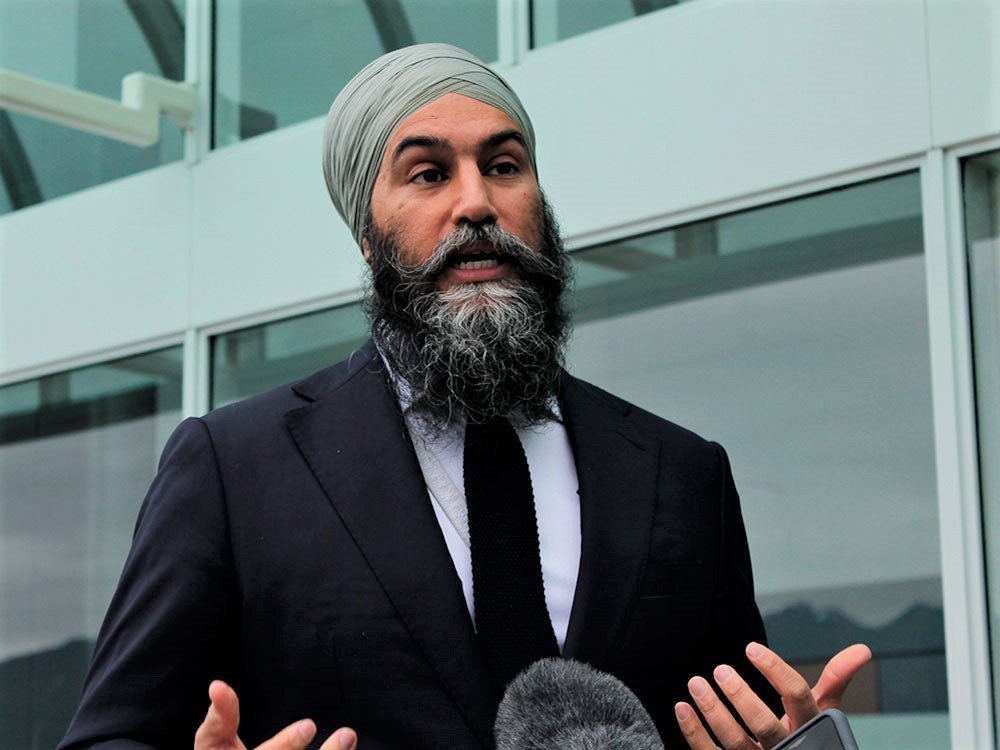NDP Leader Jagmeet Singh wants provincial governments to be prevented from using the Constitutions’s notwithstanding clause to deny unions' right to strike after Ontario Premier Doug Ford invoked it in an attempt to head off job action by education workers.
Singh told delegates at the BC Federation of Labour convention this week that Ontario’s abandoned attempt to use the clause to impose a collective agreement on education workers could set a dangerous precedent.
“There has got to be a limitation. It should not be used that way,” Singh told delegates. “We’re working at the federal level to find ways to limit its use.”
Singh’s comments came a week after Ontario repealed Bill 28, which imposed a contract on 55,000 education workers represented by CUPE and banned them from going on strike.
The law relied on Section 33 of the Canadian Charter of Rights and Freedoms — the notwithstanding clause — which allows the federal and provincial parliaments to pass legislation overriding guaranteed human rights.
The bill sparked condemnation from labour and human rights groups and Prime Minister Justin Trudeau.
Singh told the convention it was part of an ongoing “war on workers.” Premier Doug Ford backed down from the bill and the government reached a tentative deal with CUPE workers earlier this week.
The affair sparked concerns from labour groups who worry other provincial governments may bypass collective bargaining with unions. Employees’ right to bargain collectively was recognized in the B.C. Hospital Employees’ Union’s landmark Supreme Court victory in 2007.
Newly minted B.C. Premier David Eby made a point of telling federation delegates that his government would not invoke the clause in that way. He received a standing ovation.
“Can you imagine that I have to make that commitment to you? That that is an issue?” Eby said.
And Canadian Labour Congress president Bea Bruske dedicated part of her speech to excoriating the Ford government, backed by yells of “shame” from the crowd.
Singh, whose party is supporting the federal Liberals in Parliament, argued the clause should be limited to “very specific or unique situations.” He and others worry Bill 28 could create a new precedent for how the clause is invoked.
“It can’t have been what was envisioned when we signed on to having a Charter of Rights and Freedoms,” Singh said in an interview after he spoke at the convention.
A spokeswoman for federal Attorney General David Lametti said the clause should not be used pre-emptively and that government is “looking at our options,” though she did not say what those were.
“We believe that the notwithstanding clause should be used as a last resort, and that governments must explain the exceptional circumstances that justify the suspension of legal protections,” Chantalle Aubertin said in a statement.
The federal government does not have the power to change that on its own. Amending Canada’s Constitution would require the backing of two-thirds of Canadian provinces who collectively represent at least half the total population.
Ottawa law professor Carissima Mathen says the federal Parliament could adopt a bill limiting its own powers to invoke the notwithstanding clause. But that wouldn’t affect provinces’ powers — though it would send a strong political message.
Singh said the federal government could instead submit a case to the Supreme Court of Canada, essentially asking the judiciary to rule on how broadly the notwithstanding clause can be applied.
Mathen said that court has considered similar cases in the past but that nothing prevents them from examining it again.
“The court isn’t bound by its own decisions. It’s able to reconsider them. The court has done that on a couple of occasions in very important ways,” Mathen said.
Asked why provinces would voluntarily give up the power to make their own laws, Singh said the vast majority of Canadians were uncomfortable with the prospect of their Charter rights being overturned.
“When envisioned, the whole idea of the notwithstanding clause was to bring provinces on board. It was never meant to be used preemptively to undermine fundamental rights of workers,” Singh said. ![]()
Read more: Rights + Justice, Federal Politics, Labour + Industry

















Tyee Commenting Guidelines
Comments that violate guidelines risk being deleted, and violations may result in a temporary or permanent user ban. Maintain the spirit of good conversation to stay in the discussion.
*Please note The Tyee is not a forum for spreading misinformation about COVID-19, denying its existence or minimizing its risk to public health.
Do:
Do not: